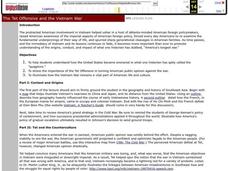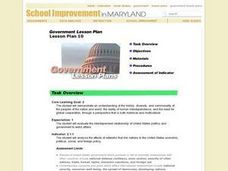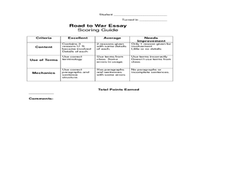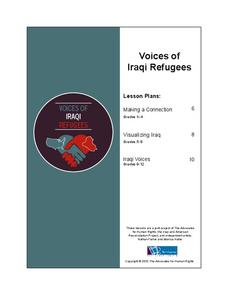Curated OER
Liberia and the U.S.: Historic Ties and Policy Decisions
Students discuss and analyze factors affecting U.S. foreign policy toward Liberia. They role-play various groups during 1900 who were concerned with the relationship between United States and Liberia as a "colony"
Curated OER
The Debate in the United States over the League of Nations
Students investigate Woodrow Wilson's ideas for peace through the League of Nations. They examine how he attempted to encourage American support for the League and the opposition to it that was found in the Senate.
Curated OER
Troop Surge vs. Redeployment
Students explore American foreign policy regarding the war in Iraq. In this Iraq debate lesson, students examine videos and documents about the pros and cons of keeping American troops in Iraq.
National Endowment for the Humanities
Lesson 1: The United States Confronts Great Britain, 1793–1796
After the Revolutionary War, the success of the United States was far from guaranteed. Foreign powers coveted the new land, and Great Britain challenged American sovereignty. Learners consider the challenges facing the new nation using...
Smithsonian Institution
Us vs. Them: The Chinese Exclusion Act of 1882
Immigration issues are nothing new. An interesting lesson focuses on the racially motivated Chinese Exclusion Act of 1882 and its impact on the Chinese American community. Scholars read articles, analyze political cartoons, and...
Curated OER
African-Americans and the Military
Students study the key figures in African-American military history. They discover how African-American military history reflect both discrimination and the often heroic struggle to overcome discrimination. They examine the key periods...
Curated OER
Managing or Meddling?
Young scholars examine Bosnian and Herzegovinian society before and during American involvement, focusing on the successes in Brcko. They write a reflective essay considering the role of "helper countries" in foreign affairs.
Curated OER
The Tet Offensive and the Vietnam War
Learners discover how the United States became involved in the Vietnam War, the importance of the Tet Offensive in turning American public opinion against the war, and how the Vietnam War is still a part of American life and culture.
Curated OER
Government Lesson Plan: Lesson Plan 10
Students explore the history, diversity, and commonality of the peoples of the nation and world. They analyze how the United States' political, economic and social goals directly affect our foreign policy.
Curated OER
The foreign and domestic policies of Lyndon B. Johnson
Eleventh graders study and evaluate the successes and failures of LBJ's domestic and foreign policies. They formulate historical questions and defend findings based on inquiry and interpretation. Each student identifies, analyzes and...
Curated OER
Early U. S. Involvement in World War II
Ninth graders examine how the U. S. was aided by the Allies in World War II before the U. S. declared war. They analyze the evolution of U. S. foreign policy from the beginning of WW II through U. S. Declaration of War
Curated OER
American Reactions to Fascist Aggression
Students consider the causes of World War II. In this origins of World War II instructional activity, students discuss American reactions to fascist aggression prior to the war.
Rutgers University
African-Americans in WWII
Using transcripts of interviews of African-Americans who served in WWII, class members work in pairs to understand their experience. Prior to the group work, the teacher provides background on WWII and the African-American experience....
Advocates for Human Rights
Voices of Iraqi Refugees
The stated goal of this resource is to provide learners with basic facts about and build empathy for Iraqi refugees. To do so elementary classes develop a plan for how to welcome refugees to their classroom. Middle schoolers read...
Theodore Roosevelt Association
Roosevelt's Legacy: Conservation
The legacy of Theodore Roosevelt carries through modern American politics, economics, foreign policy, and society. But his proudest and most profound efforts were in the world of conservation, and in preserving the natural beauty of...
Curated OER
The Role of American Embassies
Students examine services provided by US embassies abroad. They determine what US ambassadors and embassies do in relation to US foreign policy and the protection of American interests.
Curated OER
Lesson 3: U.S. Neutrality and the War in Europe, 1939-1940
Students examine the U.S. neutrality policies that preceded American involvement in World War II. In this World War II lesson, students explore the events in Europe from 1939 to 1940 and Roosevelt's decision to give military aid to Britain.
Curated OER
Yellow Journalism
Seventh graders investigate yellow journalism and how it affected public opinion and the government during the Spanish American War. They define key vocabulary words, and take notes during a teacher-led lecture. In pairs they read...
Harry S. Truman Library & Museum
Marshall Plan: Convince the American People
This is an excellent resource for US history classes, especially AP history. After learning some background on the Marshall Plan, the class, divided into two groups, researches opposing positions on this aid program. Groups read and...
Curated OER
Diplomatic Duties
Tenth graders research and illustrate the diplomatic policies of American presidents, and write letters critiquing the policies of specific presidents. March 17, 2003)
Curated OER
GAURI AND PRITHVI: THE SUB-CONTINENT GOES NUCLEAR
Pupils write short papers on the background of the Pakistani missile called Gauri, named for one of the first Afghan military invaders of India in 11th century, Prithvi is named for Hindu general who fought Muslim invaders, Agni (Hindu...
John F. Kennedy Presidential Library & Museum
Military Advisers in Vietnam: 1963
How did the beginning of the Vietnam War factor into the Cold War with the Soviet Union? As part of a study of American involvement in Vietnam, class members read a letter address to President Kennedy and his response in which he...
University of California
Containing Communism Abroad
Learn more about the policy of the United States to contain communism during the Cold War. The fifth installment of an eight-part series looks at primary and secondary materials about a challenging time in history. After analyzing the...
Curated OER
The Monroe Doctrine: Whose Doctrine Was It?
Was James Monroe the sole contributor of the Monroe Doctrine? Young scholars study the doctrine and cite evidence to show contributions of John Quincy Adams and Thomas Jefferson in its formulation.

























